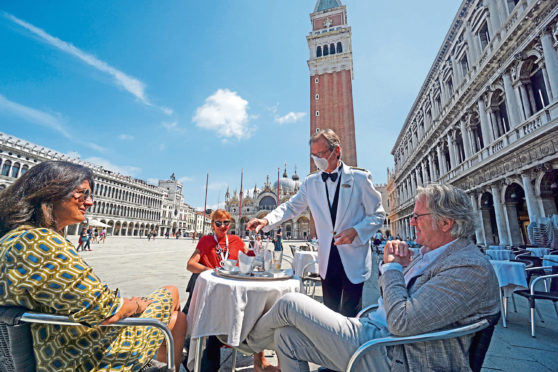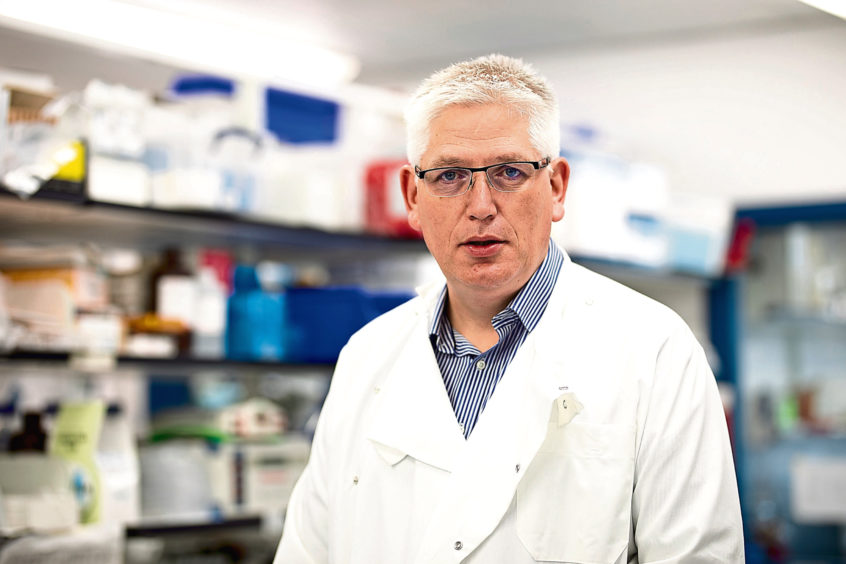
The politicians have been telling us they are following the science since before the start of lockdown, but should we be following the scientists?
Covid-19 has changed the way we live. From the wearing of face masks and the wiping down of our supermarket buys, to agonising over whether it will be safe to jet off on holiday when non-essential travel is allowed.
Each day, we make crucial decisions on what is safe for us, our families, and people around us. But how do the experts live their day-to-day lives during the pandemic? Here, The Sunday Post asks leading scientists for their personal take on what’s safe, and what’s not.
Linda Bauld
Linda Bauld is professor of public health at Edinburgh University and the mother of two teenage children.
Do you wash your groceries?
We do it when we can. It is good to be proportionate about risks, and the risks in our household with teenagers and parents who are 50 are not as great as with my elderly parents-in-law, who are both in the shielded category. My husband and I do their shopping. We wipe down their groceries with warm water and a bleach-based detergent. I always make sure I wash my hands before I go to the supermarket and when I come back. I use the same bags all the time and they do not go anywhere else.
Do you wear a face covering or gloves in shops?
I wear a face covering in shops and I would wear one on a bus. There is no point wearing gloves. If you touch a surface then touch another surface, you are transferring the virus. However, gloves are important in specific settings such as clinical and care.
Are you thinking of booking a holiday at home or abroad?
I hope we will be able to have a holiday in Scotland. Self-catering cottages might be a good option this summer. I will not travel outside the UK or within the UK until we are given advice non-essential travel is permitted. I am not worried about air travel. On an aeroplane you have filtered and recycled air that is clean. You do not have that on the underground train or bus. But there is definitely risk when you are in close proximity to other people.
Would you be comfortable sending children to school in August?
Absolutely. In terms of all we know about Covid-19, the risks to children and young people are very low. One thing we need to do is weigh up risks and benefits. Clearly the risks to our young people, who have been without education for many months, is substantial. It will delay their development and potentially affect their life chances.
Would you use a lift?
If I had to use a lift I would wear a face covering and wash my hands before and after.
Dario Alessi
Professor Dario Alessi heads a world-leading research team at Dundee University generating antibodies that will help researchers to better understand Covid-19 biology and could help in the development of drugs to prevent infection. We asked the professor, a dad of two, how he is handling the Covid-19 risk at home and outside.
Do you wash your groceries?
I tend to, but not because of the Covid situation. There are other pesticides and herbicides on fruit and vegetables and I have always given them a quick rinse. I do not cleanse parcels or packaging. The risks are so small. The chances of getting a viral particle through touching a letter is low. Virus in the population is now, as I understand it, less than one person in a thousand and probably, going forward, that is going to become one person in 10,000 or 50,000.
Do you wear a face covering or gloves in shops?
I don’t. The risk of infection by walking past somebody for a fraction of a second is low, but I would wear a mask if I went on an aeroplane or a crowded train or bus. At work you might be relatively close to somebody for a period of time, so a mask may help. Going onto the street or in shops, it may reduce your risk very slightly and may help you not to infect somebody else. I don’t wear gloves in shops. You are still touching things with gloves on, and they create a lot of plastic waste. It is better to wash your hands frequently.
Are you thinking of booking a holiday at home or abroad?
I am thinking of going on a UK barge holiday with my family. This year, maybe people should stay in the UK. There are so many beautiful places to see and support. If I had to fly I would be very comfortable doing it with a mask. I can’t see there would be any more risk in going to any country in Europe than there is walking through a city in the UK.
But it would be unwise to travel to any country where the infection is not being controlled and the death rate is not coming down significantly. There is a slight risk in getting on a plane because you won’t be a metre separated from people you don’t know. But the airflow on planes is fantastic – it gets changed and filtered. I’d avoid the toilets. You are more likely to have contact with the bugs that might be there from the previous occupant.
Would you be comfortable sending children to school in August?
I am strongly in favour of children carefully and cautiously going back to school in August. It’s been said that a child is more likely to be hit by lightning than to die from Covid-19. You have to think of the risks versus the benefits. They have missed nearly six months of education and contact with their friends.
This is very serious. It is going to have a lot of damaging effects for them long-term. Monitoring, testing and tracing (of the disease) is important and any flare-ups will need to be nipped in the bud. Other countries have gone back to school and I haven’t heard of a second wave of infection happening. We should be very encouraged by other countries that have gone back carefully and slowly. I am quite optimistic.
Would you use a lift?
I walk up steps because I like to get the exercise but if I had to use a lift I would be OK with that. It’s better to try to have it by yourself, or with just two people and stay apart.
Gary Macfarlane
Aberdeen University professor Gary Macfarlane is the clinical chair of epidemiology – a branch of medicine that deals with the spread and possible control of diseases – and the father of two grown-up children.
Do you wash your groceries?
I have always washed fruit and vegetables and I continue to do so during the pandemic. I don’t cleanse mail or parcels but after opening them I do wash my hands with soap and water.
Do you wear a face covering or gloves in shops?
Face coverings may be beneficial, we don’t
know. I don’t routinely wear them in shops but I would if going into a small shop or one with narrow aisles. When I come out, I would either use sanitising gel or, if going straight home, wash my hands with soap and water when I got back.
Are you thinking of booking a holiday at home or abroad?
I was not planning a holiday abroad in the summer and certainly would not now. If
it was essential to fly for work I would wear a face covering and take sanitising
gel. I would be comfortable holidaying in Scotland with members of my own
household and in self-catering accommodation. I wouldn’t travel to remote areas as they have limited medical facilities which should be for the local population. I would expect that it would be fine to travel from around mid-July onwards.
Would you use a lift?
I don’t normally use lifts, because it is better to use the stairs to increase your physical activity. For people who can do so, I would advise not using lifts during the pandemic to free them for those with impaired mobility. If I had to use a lift I would use a facial covering and I would hope the lift was for use by one person at a time.

Enjoy the convenience of having The Sunday Post delivered as a digital ePaper straight to your smartphone, tablet or computer.
Subscribe for only £5.49 a month and enjoy all the benefits of the printed paper as a digital replica.
Subscribe

